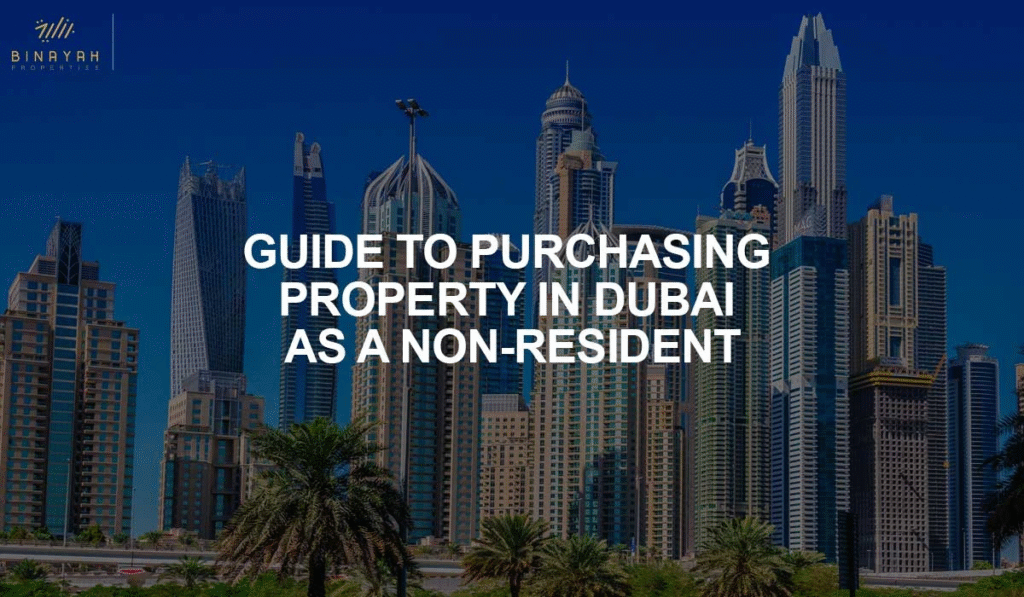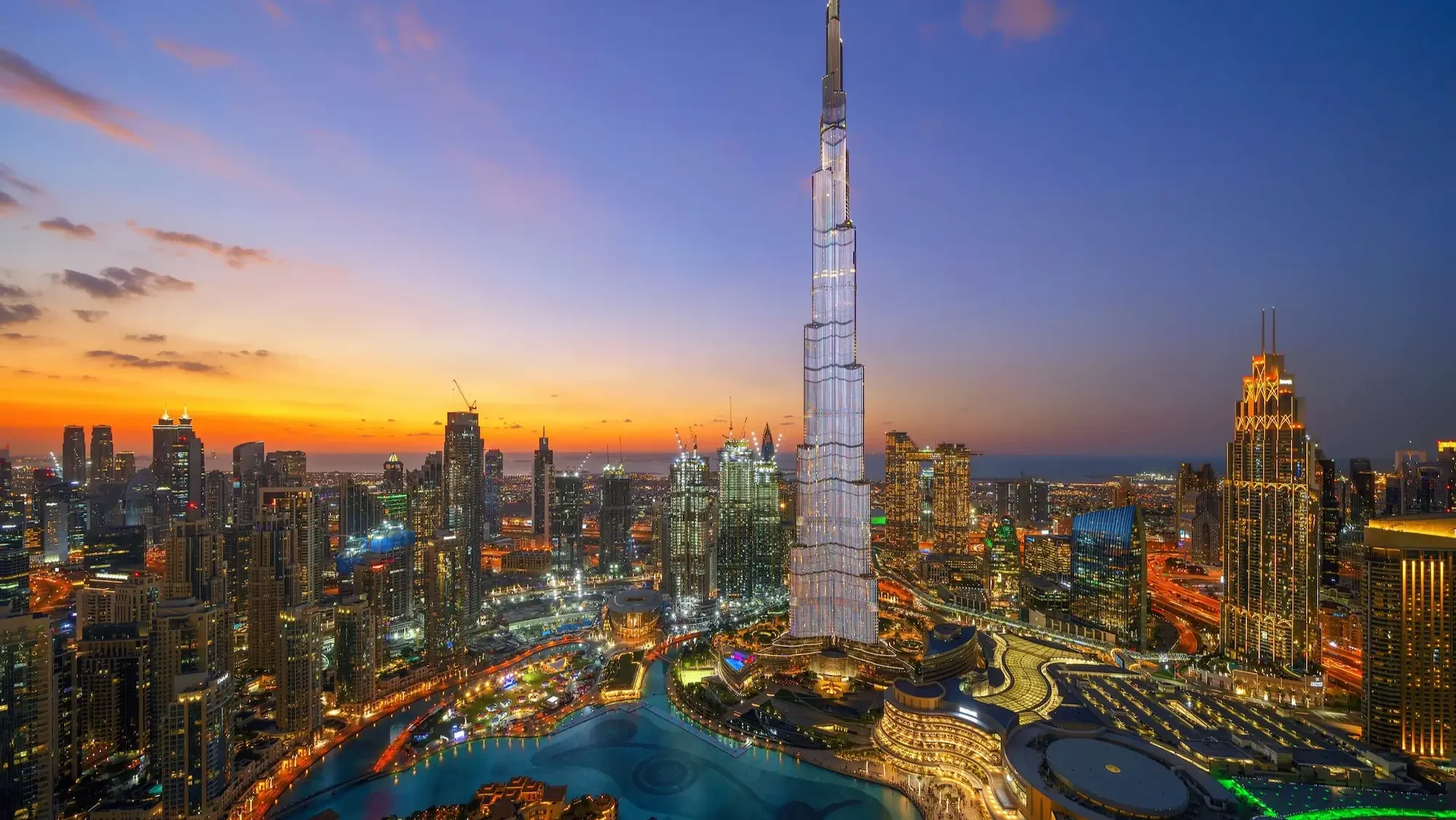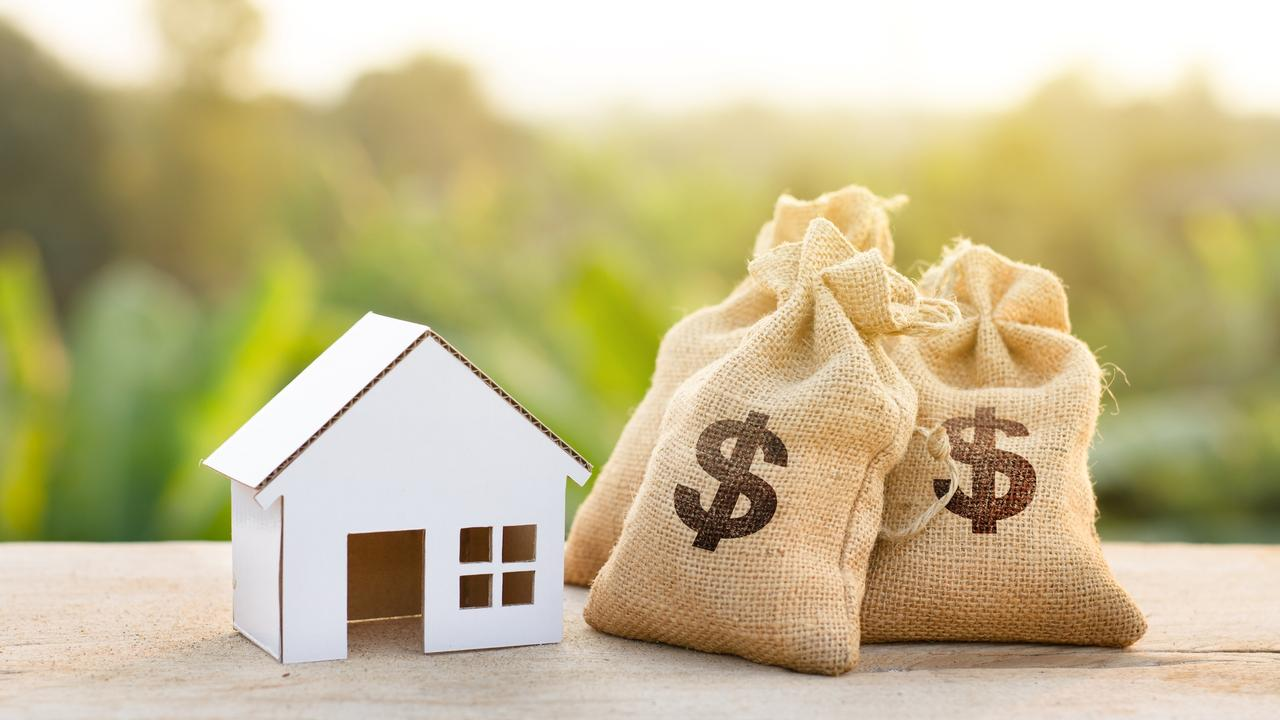Now Reading: Buying Property in Dubai as a Foreigner: Step-by-Step Guide
-
01
Buying Property in Dubai as a Foreigner: Step-by-Step Guide
Buying Property in Dubai as a Foreigner: Step-by-Step Guide

Table of Contents
Imagine owning a sleek apartment with views of Dubai’s glittering skyline or a villa with a private garden, all while building wealth in a city that’s a global hub for opportunity. As a foreigner, buying property in Dubai is not only possible but also incredibly rewarding, thanks to freehold areas where you can own property outright. With no personal income tax, capital gains tax, or annual property taxes, you keep far more than in cities like London or New York, where taxes can erode 15-40% of returns.
The UAE’s dirham, pegged to the U.S. dollar, eliminates currency risk, and residential sales are VAT-exempt, saving thousands. With a 5% population surge, 25 million tourists, and 5-8% price appreciation expected in 2025, Dubai’s 6-10% rental yields outshine global hubs like London (2-4%) or New York (3-4%).
Properties over $545,000 qualify for a 10-year Golden Visa, adding residency perks. This step-by-step guide walks you through the process of buying property in Dubai as a foreigner, from research to ownership, ensuring you make a confident investment.
Why Dubai Is a Foreigner’s Dream Market
Dubai’s freehold laws, introduced in 2002, allow foreigners 100% ownership in designated areas, a game-changer for global investors. With no personal income tax, a $200,000 property yielding 7% ($14,000 annually) stays fully yours, compared to $9,800-$11,200 after taxes elsewhere. Zero capital gains tax ensures a $100,000 profit on a sale is untouched, unlike $20,000-$28,000 lost in the U.S. or UK.
Annual property taxes, common at 1-2% ($2,000-$4,000) in other markets, don’t exist in Dubai. Residential sales are VAT-exempt, saving 5% ($10,000-$50,000), though off-plan purchases may incur recoverable VAT.
The 9% corporate tax, introduced in 2023, doesn’t apply to individuals, and free zone companies with qualifying income face zero corporate tax, saving $1,000-$20,000 yearly. With 58% of buyers being foreign nationals and flexible payment plans, Dubai’s 2040 Urban Master Plan fuels growth, making it a top destination for foreigners.
Step 1: Research Freehold Areas and Property Types

Buying Property, Start by exploring Dubai’s freehold areas where foreigners can own property, such as Dubai Marina, Jumeirah Village Circle (JVC), Dubai Hills Estate, Business Bay, and Dubai South. Each offers unique benefits: Dubai Marina boasts waterfront apartments with 6-8% yields, JVC offers affordable studios with 7-10% yields, and Dubai Hills Estate provides luxury villas with 5-8% yields and Golden Visa eligibility.
Decide between apartments ($95,288-$1.36 million), villas ($381,150-$2.18 million), or off-plan properties, which are 10-20% cheaper but carry completion risks. For example, a $150,000 JVC studio yields $12,000-$15,000 tax-free annually, while a $600,000 Dubai Hills villa yields $36,000-$48,000.
Consider your budget, lifestyle goals (urban vs suburban), and investment aims (rental income vs capital growth). Use online platforms or consult a licensed broker to compare projects like Emaar’s Palace Residences or Nakheel’s Villa Amalfi.
Step 2: Set Your Budget and Financing
Determine your budget, factoring in purchase price and additional costs. A $200,000 apartment incurs a 4% Dubai Land Department (DLD) fee ($8,000), 2% broker fee ($4,000), and a 10% deposit ($20,000). Off-plan purchases may include a 5% VAT ($10,000), recoverable via Federal Tax Authority (FTA) registration for $500-$1,000. Annual maintenance fees range from $1,500-$5,000, and landlords pay a 5% municipality fee ($600-$1,000).
For financing, UAE banks offer mortgages to foreigners with 20-50% down payments ($40,000-$100,000 for a $200,000 property) at 4-5% interest, costing $8,000-$10,000 annually. You’ll need proof of income, a valid passport, and a UAE visa (visitor or resident). Non-residents face stricter terms, so consult banks like Emirates NBD. Budget for ongoing costs like insurance ($500-$1,000 yearly) and utilities ($1,000-$2,000).
Step 3: Choose a Trusted Developer and Property
Select a reputable developer like Emaar, Nakheel, or DAMAC to minimize risks like off-plan delays. For example, Emaar’s Burj Al Arab Views in Downtown Dubai offers 1-3 bedroom apartments ($408,375-$1.36 million) with a Q3 2027 handover, while Nakheel’s Villa Amalfi in JVC offers villas ($408,375-$680,625) with a Q4 2026 handover.
Verify the developer’s track record and ensure the project uses an escrow account under the 2025 Oqood system, protecting your funds. Visit showrooms or virtual tours to inspect floor plans, amenities, and finishes. For a $300,000 Business Bay apartment, expect 6-8% yields ($18,000-$24,000 tax-free annually) and 5-7% price growth, yielding a $150,000 tax-free profit if sold for $450,000, saving $30,000-$42,000 compared to other markets.
Step 4: Hire a Licensed Real Estate Agent
Engage a licensed real estate agent registered with the DLD to navigate the market and negotiate deals. Agents charge a 2% commission ($4,000 for a $200,000 property), but their expertise saves time and ensures compliance. They’ll help you shortlist properties, arrange viewings, and verify legal documents like the title deed and developer’s No Objection Certificate (NOC). For example, in Dubai Marina, an agent can secure a $400,000 apartment in Marina Gate, yielding $24,000-$32,000 tax-free annually. Ensure your agent provides a Form A agreement, outlining their services and fees, to avoid disputes.
Step 5: Make an Offer and Sign the Sales Agreement
Once you’ve chosen a property, submit an offer through your agent. For a $200,000 JVC apartment, offer 5-10% below the asking price ($180,000-$190,000) to negotiate. Upon acceptance, sign a Memorandum of Understanding (MOU) or Form F, detailing the price, payment plan (e.g., 60/40 for off-plan), and completion date. Pay a 10% deposit ($20,000), held in escrow for off-plan properties. For completed properties, you’ll need a cheque for the deposit, payable to the seller. The MOU locks in the deal, protecting both parties. Ensure the developer or seller provides an NOC, confirming no outstanding debts on the property.
Step 6: Conduct Due Diligence and Secure Financing
Before finalizing, conduct due diligence to verify the property’s legal status. Your agent or a lawyer ($1,000-$2,000) can check for liens, disputes, or incomplete developer payments via the DLD portal. For off-plan properties, confirm escrow compliance with the 2025 Oqood system to avoid fraud. If financing, apply for a mortgage with documents like passport copies, bank statements, and proof of income. For a $200,000 loan with a 20% down payment ($40,000), expect monthly payments of $1,000-$1,200 at 4-5% interest. Non-residents may need a higher down payment (30-50%) and a UAE bank account, costing $200-$500 to open. Pre-approval strengthens your offer and speeds up the process.
Step 7: Finalize the Purchase and Transfer Ownership
For completed properties, transfer ownership at the DLD or a Trustee Office. Pay the remaining balance (e.g., $180,000 for a $200,000 property after a 10% deposit) via bank transfer or manager’s cheque. Pay the 4% DLD fee ($8,000) and a $1,000-$1,500 registration fee. The seller provides the title deed, and the DLD issues a new deed in your name within days. For off-plan properties, payments follow the developer’s schedule (e.g., 60% during construction, 40% on handover). Upon completion, the developer issues an NOC, and you finalize registration at the DLD. For a $300,000 off-plan apartment, expect a 5% VAT ($15,000), recoverable via FTA registration, saving $14,000-$14,500 after fees.
Step 8: Manage Your Investment for Returns
After ownership, decide whether to live in the property or rent it out. A $200,000 Dubai South apartment yields $12,000-$16,000 tax-free annually at 6-8%, versus $8,400-$11,200 elsewhere. Short-term rentals in Dubai Marina can boost yields by 10-20%, turning $24,000 into $28,800-$31,200. Register with the Dubai Tourism Department for short-term rentals ($500-$1,000 annually).
Annual maintenance fees ($1,500-$5,000) and a 5% municipality fee ($600-$800) apply for rentals. Set up a free zone company as a QFZP to eliminate corporate tax on up to $65,340 in rental income, saving $6,534 annually. U.S. investors can deduct depreciation ($5,940-$14,836) and management fees ($914-$2,610), saving up to $7,346. Non-U.S. investors use double taxation treaties with 130+ countries to avoid taxes like the UK’s 20-28% capital gains tax.
Step 9: Explore Golden Visa Opportunities
If your property exceeds $545,000, apply for a 10-year Golden Visa, offering residency without a sponsor. A $600,000 Dubai Hills Estate villa qualifies, requiring a DLD valuation and proof of funds. Processing costs $1,000-$2,000, and the visa allows family sponsorship, enhancing long-term value. For example, a $600,000 villa yields $36,000-$48,000 tax-free annually and could appreciate to $900,000, yielding a $300,000 tax-free profit, saving $60,000-$84,000 compared to other markets.
Navigating Risks as a Foreign Buyer

Risks like off-plan delays (6-18 months), oversupply (41,000 new units), and global economic shifts exist. Mitigate by choosing trusted developers like Emaar or Nakheel, verifying escrow compliance, and targeting high-demand areas like Dubai Marina or JVC. Ensure QFZP eligibility and proof of funds compliance to avoid fines up to $136,125. Work with a lawyer to review contracts, and consult a tax professional to maximize deductions and comply with DLD and FTA regulations.
Your Path to Dubai Property Ownership
Buying property in Dubai as a foreigner is straightforward with the right steps. Research freehold areas like JVC for affordability or Dubai Hills for luxury, set a budget with financing in mind, choose trusted developers, and hire a licensed agent. Make an offer, conduct due diligence, finalize the purchase, and manage your investment for tax-free returns. With high yields, Golden Visa perks, and a booming market, Dubai offers foreigners a chance to build wealth confidently in 2025.
read more: Dubai Marina vs Downtown: Where to Buy Property in 2025?






















